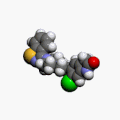Ziprasidone

Ziprasidone is an antipsychotic medication used to treat schizophrenia and bipolar disorder. It belongs to the class of drugs known as atypical antipsychotics or second-generation antipsychotics. Ziprasidone works by altering the effects of chemicals in the brain, particularly serotonin and dopamine, which are thought to be involved in the pathology of psychotic disorders and mood disturbances.
Medical Uses[edit]
Ziprasidone is primarily indicated for the treatment of schizophrenia, a mental disorder characterized by distorted thinking, perceptions, emotions, and behavior. It is also used for the acute treatment of manic or mixed episodes associated with bipolar disorder. In some cases, ziprasidone may be prescribed off-label for other conditions as determined by a healthcare provider.
Mechanism of Action[edit]
The exact mechanism of action of ziprasidone is not fully understood. However, it is believed to exert its antipsychotic effects through a combination of dopamine type 2 (D2) and serotonin type 2 (5-HT2) receptor antagonism. Ziprasidone has a high affinity for serotonin receptors compared to dopamine receptors, which may contribute to its unique clinical profile. It also exhibits affinity for other neurotransmitter receptors, including histamine and adrenergic receptors, which may explain some of its side effects.
Pharmacokinetics[edit]
After oral administration, ziprasidone is well absorbed, with peak plasma concentrations occurring within 1 to 6 hours. Its bioavailability is significantly increased when taken with food. Ziprasidone is extensively metabolized in the liver, primarily through aldehyde oxidase and cytochrome P450 3A4 (CYP3A4). Its elimination half-life ranges from 2 to 5 hours, and it is excreted primarily in the urine and feces.
Side Effects[edit]
Common side effects of ziprasidone include dizziness, nausea, constipation, and somnolence. It may also cause orthostatic hypotension, leading to dizziness or fainting upon standing up too quickly. Unlike some other atypical antipsychotics, ziprasidone has a lower risk of weight gain and metabolic syndrome. However, it has been associated with a risk of QT interval prolongation, a type of heart rhythm disturbance, which necessitates caution in patients with certain cardiovascular conditions.
Contraindications[edit]
Ziprasidone is contraindicated in individuals with a known hypersensitivity to the drug or any of its components. It should not be used in patients with a history of QT interval prolongation, recent acute myocardial infarction, or uncompensated heart failure. Caution is advised when prescribing ziprasidone to patients with a history of seizures or conditions that could affect the metabolism or hemodynamic responses.
Interactions[edit]
Ziprasidone may interact with other medications that prolong the QT interval, increase the risk of arrhythmias, or affect its metabolism. These include certain antidepressants, antibiotics, and drugs that inhibit or induce CYP3A4. Patients should inform their healthcare provider of all medications they are taking to avoid potential drug interactions.
Conclusion[edit]
Ziprasidone is an effective medication for the treatment of schizophrenia and bipolar disorder, with a unique pharmacological profile that distinguishes it from other atypical antipsychotics. While it has a favorable side effect profile in terms of metabolic effects, its potential for causing QT interval prolongation requires careful patient selection and monitoring.
Ziprasidone[edit]
-
Chemical structure of Ziprasidone
-
Ball-and-stick model of Ziprasidone
-
3D animation of Ziprasidone
-
GEODON 60 mg capsule
Ad. Transform your life with W8MD's Budget GLP-1 injections from $49.99


W8MD offers a medical weight loss program to lose weight in Philadelphia. Our physician-supervised medical weight loss provides:
- Weight loss injections in NYC (generic and brand names):
- Zepbound / Mounjaro, Wegovy / Ozempic, Saxenda
- Most insurances accepted or discounted self-pay rates. We will obtain insurance prior authorizations if needed.
- Generic GLP1 weight loss injections from $49.99 for the starting dose of Semaglutide and $65.00 for Tirzepatide.
- Also offer prescription weight loss medications including Phentermine, Qsymia, Diethylpropion, Contrave etc.
NYC weight loss doctor appointmentsNYC weight loss doctor appointments
Start your NYC weight loss journey today at our NYC medical weight loss and Philadelphia medical weight loss clinics.
- Call 718-946-5500 to lose weight in NYC or for medical weight loss in Philadelphia 215-676-2334.
- Tags:NYC medical weight loss, Philadelphia lose weight Zepbound NYC, Budget GLP1 weight loss injections, Wegovy Philadelphia, Wegovy NYC, Philadelphia medical weight loss, Brookly weight loss and Wegovy NYC
|
WikiMD's Wellness Encyclopedia |
| Let Food Be Thy Medicine Medicine Thy Food - Hippocrates |
Medical Disclaimer: WikiMD is not a substitute for professional medical advice. The information on WikiMD is provided as an information resource only, may be incorrect, outdated or misleading, and is not to be used or relied on for any diagnostic or treatment purposes. Please consult your health care provider before making any healthcare decisions or for guidance about a specific medical condition. WikiMD expressly disclaims responsibility, and shall have no liability, for any damages, loss, injury, or liability whatsoever suffered as a result of your reliance on the information contained in this site. By visiting this site you agree to the foregoing terms and conditions, which may from time to time be changed or supplemented by WikiMD. If you do not agree to the foregoing terms and conditions, you should not enter or use this site. See full disclaimer.
Credits:Most images are courtesy of Wikimedia commons, and templates, categories Wikipedia, licensed under CC BY SA or similar.
Translate this page: - East Asian
中文,
日本,
한국어,
South Asian
हिन्दी,
தமிழ்,
తెలుగు,
Urdu,
ಕನ್ನಡ,
Southeast Asian
Indonesian,
Vietnamese,
Thai,
မြန်မာဘာသာ,
বাংলা
European
español,
Deutsch,
français,
Greek,
português do Brasil,
polski,
română,
русский,
Nederlands,
norsk,
svenska,
suomi,
Italian
Middle Eastern & African
عربى,
Turkish,
Persian,
Hebrew,
Afrikaans,
isiZulu,
Kiswahili,
Other
Bulgarian,
Hungarian,
Czech,
Swedish,
മലയാളം,
मराठी,
ਪੰਜਾਬੀ,
ગુજરાતી,
Portuguese,
Ukrainian



